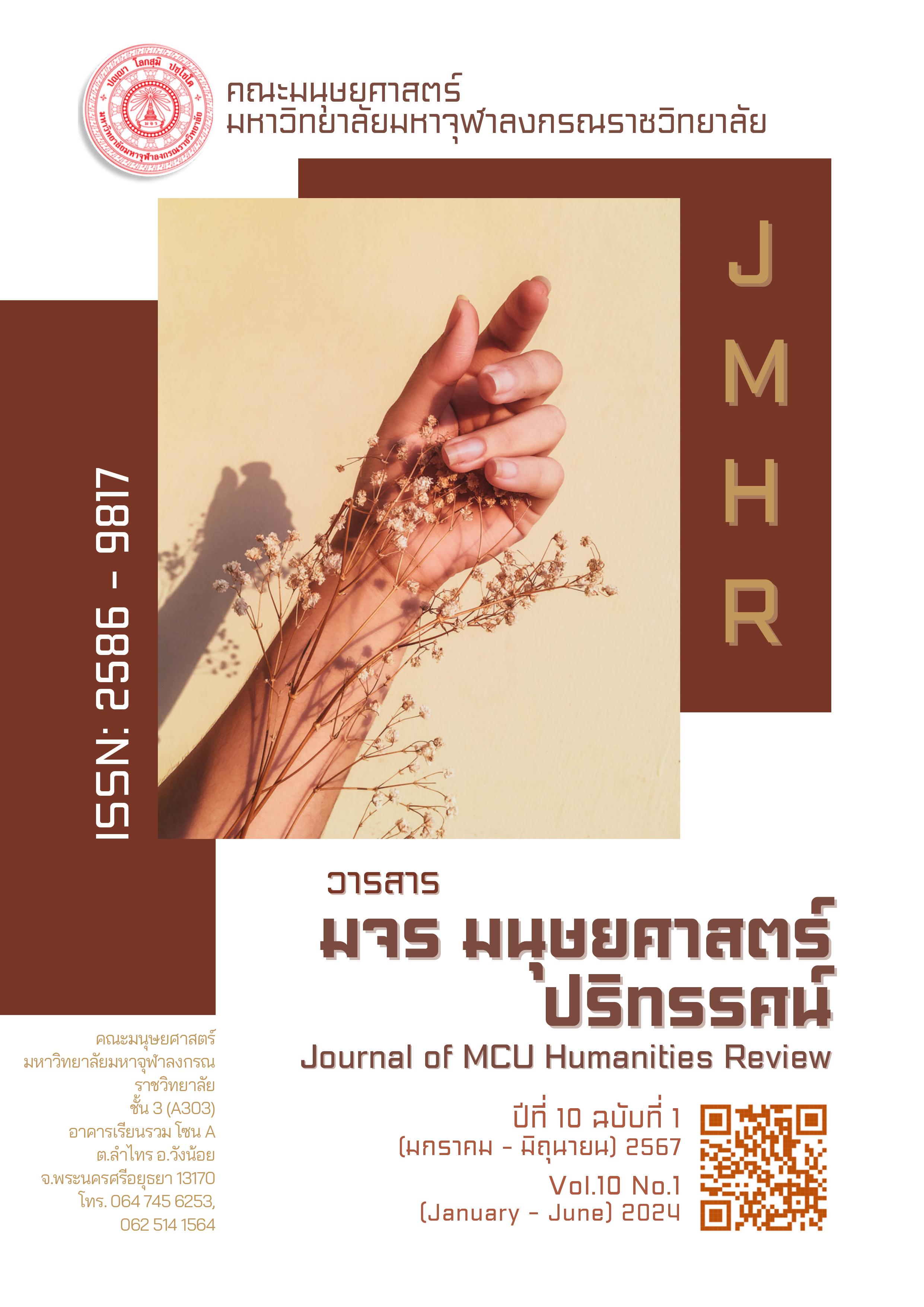จิตวิทยาบุคลิกภาพสำหรับผู้นำ
คำสำคัญ:
การพัฒนา, บุคลิกภาพ, ผู้นำ, การรู้จักตัวเอง, การเช้าใจผู้อื่นบทคัดย่อ
บุคลิกภาพเป็นสิ่งสำคัญที่ปรากฏต่อสายตาของบุคคลอื่นเมื่อพบเห็น เป็นลักษณะเฉพาะตัวของบุคคลในด้านต่าง ๆ ทั้งส่วนภายนอกและภายใน ส่วนภายนอก คือส่วนที่มองเห็นได้ชัดเช่นรูปร่างหน้าตา กริยามารยาท ส่วนภายใน คือ สติปัญญา ความถนัด ลักษณะอารมณ์ประจำตัว เป็นคุณลักษณะพิเศษที่เกิดขึ้นโดยธรรมชาติเหมือนกัน เป็นคุณลักษณะที่เป็นอิสระจากสังคม วัฒนธรรมและการอบรมสั่งสอน โดยเฉพาะเรื่องของบุคลิกภาพของผู้นำ จะมีผลต่อความน่าเชื่อถือเป็นอย่างมาก จึงถือว่าเรื่องนี้มีความสำคัญอย่างยิ่ง ด้วยเหตุเพราะจะช่วยเพิ่มความเชื่อมั่นให้กับผู้นำที่มีบุคลิกภาพที่ดี เพิ่มความความน่าศรัทธาแก่ผู้ตาม ซึ่งถือว่าเป็นสิ่งที่สำคัญมากในการที่จะมีปฏิสัมพันธ์ที่ดีกับผู้ตาม และการที่มีผู้นำต้นแบบที่มีบุคลิกภาพที่ดี จะเป็นแนวทางในการพัฒนาบุคลิกภาพที่ดีของผู้ตามไปในตัว ทำให้องค์กรมีบุคลากรที่มีบุคลิกภาพที่ดีกันทั่วทั้งองค์กร ส่งผลดีต่อภาพลักษณ์ขององค์กร ซึ่งก็มีผลกระทบต่อทัศนคติที่ของคนในองค์กรกลับมาอีกด้วย เพราะองค์กรที่มีภาพลักษณ์ที่ดีจะทำให้พนักงานในองค์กรมีความภาคภูมิใจและทำให้มีความตั้งใจในการทำงานมากขึ้น ท้ายที่สุดผลประกอบการขององค์กรก็จะดีขึ้นตามไปด้วย ดังนั้นจะเห็นได้ว่าบุคลิกภาพที่ดีของผู้นำนั้นเป็นพื้นฐานสำคัญที่ส่งผลต่อทั้งทีมและองค์กรในทางที่ดีและมีอิทธิพลที่สำคัญต่อสถานการณ์และบรรยากาศภายในองค์กร ที่มีความสุขทั้งผู้บริหารและบุคลากรในองค์กรก็เพราะได้มีการพัฒนาบุคลิกภาพของผู้นำไปในทิศทางที่ดีให้การทำให้การปฏิบัติภารกิจต่าง ๆ ให้บรรลุผลสำเร็จ
เอกสารอ้างอิง
จักรแก้ว นามเมือง. (2560). บุคลิกภาพของครูและลักษณะการสอนที่ดี. วารสารบัณฑิตแสงโคมคำ, 2(1), 17-18.
จิราภรณ์ ตั้งกิตติภาภรณ์. (2559). จิตวิทยาบุคลิกภาพและพฤติกรรมสุขภาพ. กรุงเทพฯ : สำนักพิมพ์แห่งจุฬาลงกรณ์มหาวิทยาลัย.
ชณภา ปุญณนันท์. (2564). การบูรณาการพฤติกรรมมนุษย์ตามแนวจริตในพระพุทธศาสนากับปรัชญากุญแจเก้าดอกของสถาบัน พลังจิต ธรรมะ จักรวาล. วารสารวิจยวิชาการ, 4(1), 213-222.
โดนัลด์ โอ คลิฟตัน (Donald O. Clifton), ทอม แรธ (Gallup Strengths Center).(2559). เจาะจุดแข็ง 2.0 (STRENGTHS FINDER 2.0). กรุงเทพฯ : สำนัก พิมพ์เนชั่นบุ๊คส์.
ธัญญาภัทร์ เลิศจันทรากูร. (2562). เทคนิคการพัฒนาบุคลิกภาพ (Personality Development Techniques). กรุงเทพฯ : บริษัท ซีเอ็ดยูเคชั่น จำกัด.
บัญญัติ บุญญา. (2558). Enneagram ศาสตร์แห่งการวิเคราะห์คน. กรุงเทพฯ : สำนัก พิมพ์ปัญญาชน.
เบียทริซ เซสนัต. (2565). คู่มือทำงานคน 9 ไทป์ ใจสำราญ งานสำเร็จ [THE 9 TYPES OF LEADERSHIP] (วาจาสิทธิ์ ลอเสรีวานิช, ผู้แปล). นนทบุรี : บริษัทอมรินทร์ พริ้นติ้ง (มหาชน) จำกัด.
พุทธชาติ ภูจอมจิต. (2563). การพัฒนาโปรแกรมเสริมสร้างภาวะผู้นำเชิงสร้างสรรค์ของครูโรงเรียนประถมศึกษา. UMT-POLY Journal, 17(1), 109 – 117.
ภัทร กิตติมานนท์. (2565). วิชาเข้าใจคน:ผู้นำสี่ทิศ (Me,Myself 12 ตัวตน). นครปฐม : บริษัท เอ็กเซลเลนท์ พีเพิล จำกัด.
เรนนี บารอน. (2563). ไขรหัสใจ 16 Types รู้ใจคน เข้าใจตนเอง [What Type Am I? Discover Who You Really Are] (วาจาสิทธิ์ ลอเสรีวานิช, ผู้แปล). นนทบุรี : ห้างหุ้นส่วนจำกัด สามลดา.
วณัฐพร ภักดี และ อภิสิทธิ์ แสงใส. (2565). ความเหมือนทางบุคลิกภาพกับประสิทธิภาพของทีมพัฒนาซอฟต์แวร์กรณีศึกษานิสิตสาขาวิชาวิศวกรรมซอฟต์แวร์.
วารสารวิทยาศาสตร์ มข., 50(1), 15.
ศรีเรือน แก้วกังวาน. (2562). ทฤษฎีจิตวิทยาบุคลิกภาพ (รู้เรารู้เขา). กรุงเทพฯ : สำนัก พิมพ์หมอชาวบ้าน.
ศิริพงษ์ กลั่นไพฑูรย์. (2564). รูปแบบการพัฒนาภาวะผู้นำทางวิชาการในยุคดิจิทัลของผู้บริหารสถานศึกษาขั้นพื้นฐาน (วิทยานิพนธ์การศึกษาศาสตร์ดุษฎีบัณฑิต). มหาวิทยาลัยนเรศวร. พิษณุโลก.
สรายุทธ สิมมาจันทร์. (2563). ภาวะผู้นำทางวิชาการของผู้บริหารโรงเรียนที่ส่งผลต่อประสิทธิผลการบริหารวิชาการของโรงเรียนสังกัดสำนักงานเขตพื้นที่การศึกษาประถมศึกษานครพนมเขต 2. (วิทยานิพนธ์ครุศาสตรมหาบัณฑิต). มหาวิทยาลัยราชภัฏสกลนคร. สกลนคร.
สุทธามณี ธนะบุญเรือง. (2565). ความสัมพันธ์ระหว่างอุปนิสัยส่วนบุคคล บุคลิกภาพ กับคุณลักษณะความเป็นผู้ประกอบการของผู้ประกอบการวิสาหกิจขนาดกลางและขนาดย่อมในจังหวัดเชียงใหม่. วารสารวิชาการการบินการเดินทางและการบริการ, 1(2), 107.
Gerard I. Niereberg, Henry H. Calero. (2557). วิธีอ่านคนให้ทะลุถึงใจ [HOW TO READ A PERSON LIKE A BOOK] (วัลภา ลินลาวรรณ, ผู้แปล). นนทบุรี : สำนักพิมพ์ บี มีเดีย.
Mr. Speaker. (2562). หยั่งรู้ใจคนในทุกสถานการณ์ (Getting What You Want With PERSUASION). กรุงเทพฯ : ห้างหุ้นส่วนจำกัด ซี แอนด์ เอ็น.
ดาวน์โหลด
เผยแพร่แล้ว
รูปแบบการอ้างอิง
ฉบับ
ประเภทบทความ
สัญญาอนุญาต
ลิขสิทธิ์ (c) 2024 วารสาร มจร มนุษยศาสตร์ปริทรรศน์

อนุญาตภายใต้เงื่อนไข Creative Commons Attribution-NonCommercial-NoDerivatives 4.0 International License.






